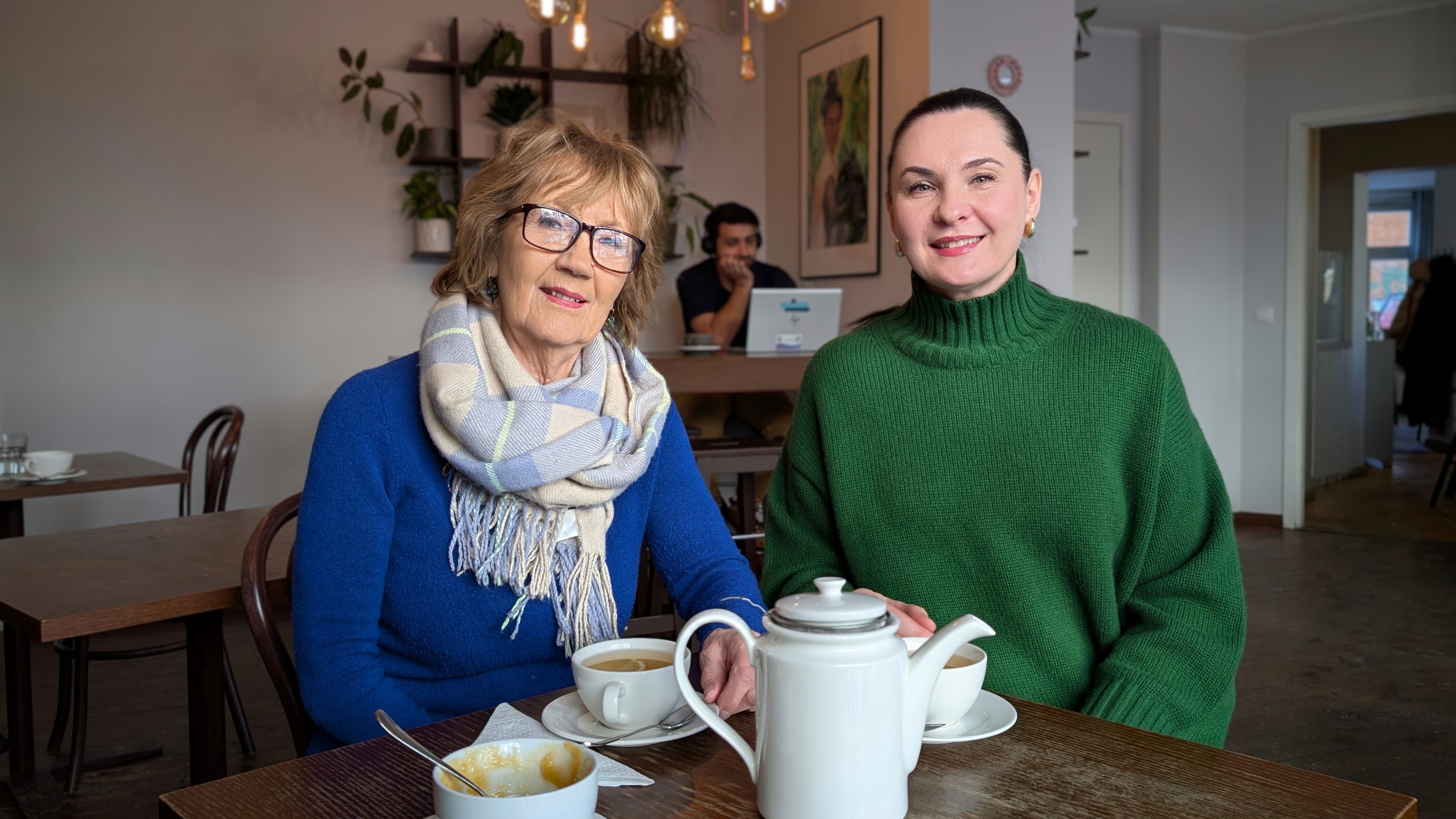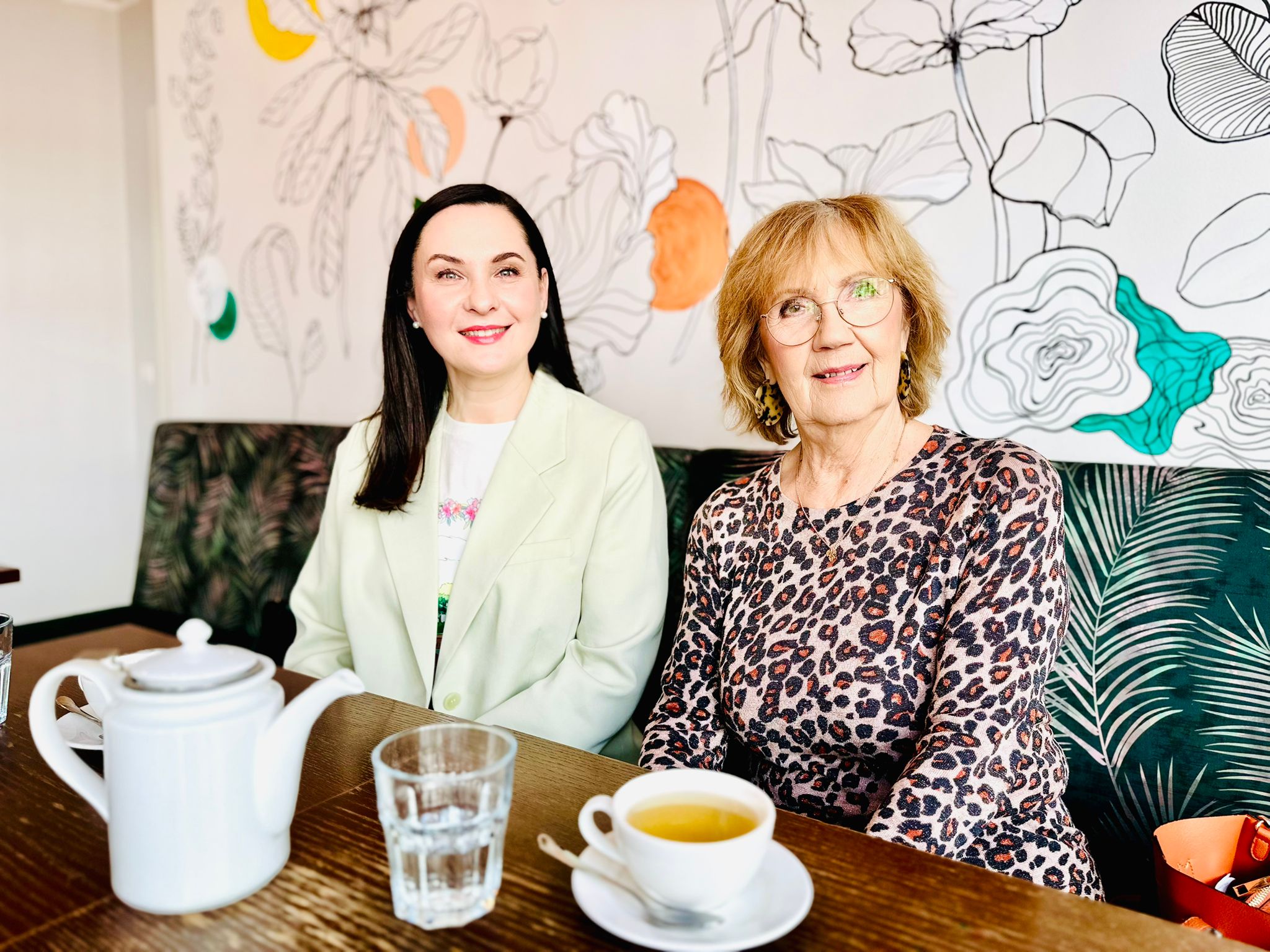This year, the Integration Foundation brought together the largest number of language friends to date. From February until May, 1,023 pairs of language friends met and practised Estonian, i.e. native speakers and language learners who discussed all sorts of topics in Estonian. The charming and legendary TV host Reet Linna and Natalia Ermakov, who is dedicated to learning about the culture of the Finno-Ugric nations, took the time for language friends from their busy schedules.
Three months of language friends. How would you sum it up?
Natalia: Inspiring!
Reet: Positive!
Could you explain in greater detail what you’ll remember the most from the months spent with language friends?
Natalia: I appreciate that Reet made time for me in her hectic schedule. When we talked, she was truly there for me – she was prepared, listened carefully, and supported me wholeheartedly. This is invaluable and I am extremely grateful to her. I learned a lot from Reet by observing how she builds sentences in Estonian and how she speaks. I listened to the songs that have lyrics written by Reet. They are very warm and talk a lot about loving one another and caring about each other.
Reet: We did not have any distractions, so we could relax and focus. Natalia has many people who listen to her and her words have a lot of weight. Everything we say has an effect – you must know what you are talking about. And then there is body language that you must consider. I was not the only teacher in this process by far. I acquired a lot of invaluable information about the Erzyas and Finno-Ugric culture in general from Natalia. I am extremely curious by nature, so I learned a lot.
There were probably plenty of topics for discussion. Was there anything that was particularly fascinating or unexpected that took you by complete surprise?
Reet: We met around Easter one time, and everything that Natalia shared about the customs of her people was so fascinating! Afterwards, I went home and told my children for quite a while about how my language friend celebrates Easter. I was very excited. I told Natalia about my family as well – my father was a composer and a musician and I have been surrounded by music all my life. Often, dad would take me along to the Pirita Restaurant for the day-time rehearsals, we ordered pancakes, and he taught me how to use a knife and a fork when I was quite young. I have always considered it extremely important for my children as well, and taught them good manners from a very early age.
Natalia: I loved Reet’s family traditions and how much you love and care about each other. How you meet with your relatives in the beginning of May every year to celebrate your grandmother’s birthday and everything you do then. It is very important for children to know their roots.
It seems that you have a lot in common. What kind of similarities did you discover when you spent time together? And what kind of differences did you notice?
Natalia: We found something in common when we met in the Solaris Café and both admired the wonderful old ladies who were sitting with their cups of coffee, all dressed up, and discussed the matters of the world. This was absolutely wonderful to witness.
Reet: It reminded me of the old café culture that is starting to disappear in many respects. It is important to maintain dignity to the ripe old age, get out of the house, and enjoy life.
Natalia: My motto is that I do not look for differences in people, but for similarities.
Reet: I have always been very lively and somewhat loud, but Natalia is more like a lady – restrained and demure. Our views are quite similar, but we have very different characters.
Thinking back on the time when you decided to become a language friend – what has been easier than you expected? What has been harder?
Reet: I actually studied to be a teacher in my time, and therefore, I initially thought about helping the person without directly teaching her. The subsequent meetings showed me that it is very easy – you must listen and indicate in a manner you agreed and explain the correct way of saying things. So, I realised how important it is for us, Estonian speakers, to keep speaking in Estonian and not switch to another language. I have shared this observation with others as well!
The difference has been in how Natalia insists on addressing me very formally and I have not succeeded in getting her to use more informal language with me. I, naturally, switched to more informal communication right from the start. Again – Natalia has a wonderful upbringing and her cultural background really shines through.
Natalia: I guess we do switch to more informal manner, but it definitely takes more time for us before we get to that point in relationships.
Reet: Nevertheless, there was nothing complicated when we met and talked. People who paired us did well. There are very few coincidences in life!
What would you recommend to future language friends?
Reet: To talk and to listen! People living in Estonia have more in common than you would think. I became interested in Natalia and other nationalities during the grand finale of the Year of Cultural Diversity that took place in the Viru Centre in January. The sight was amazing – I couldn’t have imagined such diversity in our small country. My conversations with Natalia confirmed that this diversity is our joint strength – we value our roots and protect our country.
Natalia: You must have courage, find time, and be open. Then, new experiences and knowledge will find you. Meeting the grand figures in Estonian history, such as Lennart Meri, Ingrid Rüütel, Mare Kõiva, Arvo Valton, Marju Kõivupuu, and many others, has been wonderful, but none of that would have happened if I had been apprehensive or ashamed about my proficiency in Estonian back then and not communicated with them at all. I cannot imagine what I would have completely missed out on.
How will your language friendship continue?
Natalia: My big dream is to cooperate with Reet more closely in the future. We will have an opportunity in September – we can sing together on Town Hall Square at the Day of Nationalities.
Reet: The stories that Natalia shared about Erzyan culture and the cultures of other Finno-Ugric nations were so wonderful that I must share these with my viewers. And we will in the autumn!
ANYONE CAN BECOME A LANGUAGE FRIEND!
The Integration Foundation is launching the next, seventh Language Friends programme in January next year. For more information, please visit the website of the foundation at https://integratsioon.ee/keelesober and follow it in social media: https://www.facebook.com/integratsioonisihtasutus.
You can read about the last, record-breaking season on the website of the foundation at https://integratsioon.ee/keelesobra-programmis-osalenud-juba-7364-eesti-keele-sopra.

Reet and Natalia met for the first time on 19 February.

To show her appreciation for the discoveries they made together, Reet gave Natalia some of her music and Natalia gave Reet a collection of Erzyan poetry, translated into Estonian.
